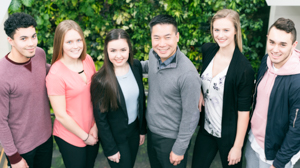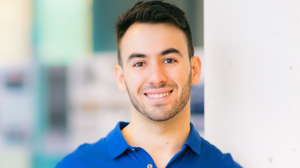

This was a really important opportunity for me and definitely opened up more doors."
When Kinesiology student Joey Villella used to think about academic research, he used to imagine that it was a rather slow process that would likely involve working away on computers, peering into microscopes, or navigating through thick textbooks.
Villella’s preconceptions immediately faded once he had his first opportunity to immerse himself in Research at the University of Guelph-Humber.
Last summer, Villella took a research position at UofGH with Kinesiology instructor Dr. John Zettel at his Guelph laboratory. While working at Dr. Zettel’s lab, Villella began thinking about his fourth-year thesis project. Dr. Zettel’s research blends his backgrounds in biomechanics and visuomotor control. He is working to develop an understanding of balance and movement from a fundamental level to address impaired mobility and falls in older adults and other clinical populations. Inspired by that work, Villella decided his thesis would focus on the effectiveness of kinesiology tape in aiding balance recovery.
As he began exploring the topic, Villella quickly realized that conducting research in his field was a far more dynamic and stimulating experience than he had expected.
“Since first going into university, research was always in the back of my mind. But I thought it was about looking under a microscope at cells or computer work,” Villella explained.
“The research I’m doing now, where I have my subjects standing atop a motion platform that I operate to perturb them off-balance, I never would have guessed that it would be considered research. I had no idea what it would be like, but I am very thrilled with how it all turned out.”
Presenting his research
Villella’s findings were compelling enough that he was invited to present his research at the Ontario Exercise Physiology Conference.
The annual event brings together experts in a wide range of exercise physiology fields, including cardiovascular respiratory physiology, muscle physiology, exercise and health, molecular signalling, nutrition and metabolism.
Through much of the day, Villella and a contingent of instructors and students from the University of Guelph-Humber took in illuminating presentations from other researchers before it was his turn to present in the afternoon.
Once he took the stage, Villella found that his nerves faded away. He had initially wondered whether his paper – a biomechanics study – would be of interest to attendees who mostly specialized in physiology, but he was met with an engaged and receptive audience. After his presentation, he fielded questions from the crowd.
“The Q-and-A might have been the most intimidating part, but I didn’t find the questions too difficult,” he said. “I felt I answered the questions confidently.”
Lessons for the future
Although Villella plans to attend the Canadian Memorial Chiropractic College and eventually get into chiropractic work, he said the skills he developed assisting Dr. Zettel in his research have been an invaluable help both in his course work and in preparing him for future employment opportunities.
Further, after Villella’s presentation, he was offered another opportunity to present his research at the 2018 Saltin International Graduate Course in Exercise and Clinical Physiology in September in The Blue Mountains, Ont.
As he prepares for that presentation opportunity and others to come, Villella’s experience at the Ontario Exercise Physiology Conference will give him a sense of self-assurance he will carry forward.
“I would definitely do it again. I have no problem presenting in front of people in a setting like that now,” he said. “There’s only one way to find out if something like this is for you and if you’re capable, and that’s just to go for it. This was a really important opportunity for me and definitely opened up more doors.”







